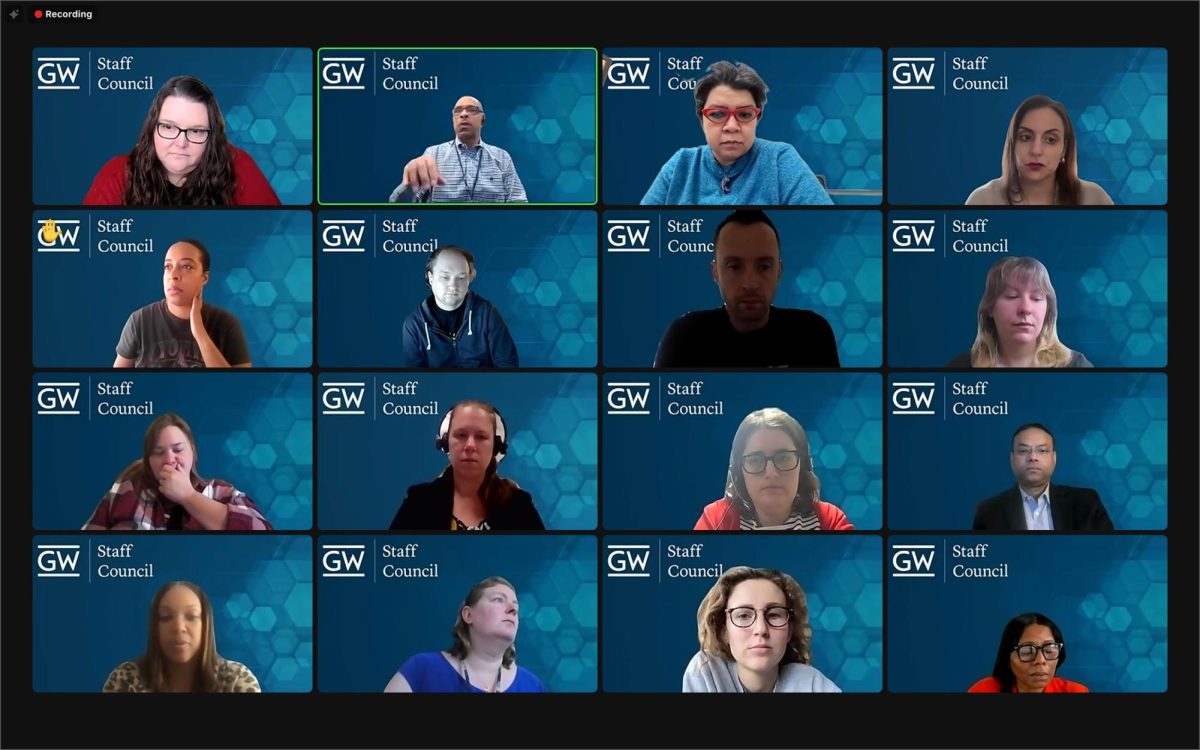Officials have continued to pay millions of dollars to an outside company for online graduate course materials as the number of students enrolled in online courses at GW increases despite criticism from federal officials around the ambiguity of agreements like GW’s.
Officials paid more than $18 million in the last fiscal year to 2U, Inc. – one of the largest educational online program management companies in the country – to make a series of graduate certificate programs and boot camps, according to GW’s Form 990 – an annual public disclosure filed with the Internal Revenue Service. Experts in higher education said online learning companies like 2U have come under criticism by industry and government leaders because of their long-term contracts that often lock schools into paying off much of the revenue from their virtual courses.
University spokesperson Josh Grossman declined to comment on whether enrollment in the courses 2U provides to GW has changed in the last academic year. He also declined to say how long the University’s contract with 2U will last, what types of programs they provide to graduate students and whether officials believe their relationship with 2U is sustainable going forward.
“As the modern workforce continues to evolve, workers need to be skilled in new ways to keep pace with changes in the marketplace and within industries,” Grossman said in an email. “Flexibility is also important to students who may want to benefit from a GW education from other parts of the country or world. Partnering with 2U and other online education companies enables the University to offer innovative education that meets the needs of lifelong learners in a variety of fields.”
The number of students enrolled in online courses at GW increased by about 450 students between 2018 and 2021, according to the University’s enrollment dashboard. The number of enrolled online graduate students increased by about 600 students, while the number of online nondegree students – like those enrolled in nondegree “boot camps” – increased by 26 students in the same period, according to the University’s enrollment data.
The data does not show how many of these students are enrolled in courses that 2U had a role in making or what enrollment looks like in the 2022 academic year.
In its quarterly report to investors in July, 2U officials said its total revenue and course enrollment dropped by about two percent year-over-year and it laid off about 20 percent of its employees as a result.
The U.S. General Accountability Office, a government auditing agency, released a report in May criticizing the higher education industry’s relationship with online program management companies like 2U, because of the vague details about profit-sharing and time frames in the contracts that higher education institutions sign with them. Sen. Elizabeth Warren, D-MA., Sen. Sherrod Brown, D-Ohio, and Tina Smith, D-AZ., also wrote an open letter to the CEOs of eight online program management companies – including the CEO of 2U – in January, calling for more transparency into the financial arrangements they’ve made with colleges and universities.
A report published in 2019 by The Century Foundation, a New York-based think tank, found most of 2U’s arrangements with universities revolve around tuition-sharing agreements, where the institution agrees to pay 2U 40 to 65 percent of the tuition generated from their courses for a six to 10-year period on average. The contracts are often unclear about who controls the course materials and student information, according to the report.
Higher education experts said that as companies like 2U have come under scrutiny from government agencies and politicians, many colleges and universities are moving away from contracting outside firms to make their online coursework, but instead use their own faculty and technology teams to build online materials.
Joshua Kim, the director of online programs and strategy at Dartmouth College, said the demand for online graduate programs rose significantly during the COVID-19 pandemic as more people were out of work or working virtually from home. But he said that demand has slowed in recent months as people return to work in person and have less time and resources to attend online graduate courses, causing many online program management firms to make cuts to their staff to remain afloat.
“Certainly demand is not growing as fast as it did during COVID, but we’ll see if it stays at a high level and that market grows or what’s going to happen, we just don’t know yet,” he said.
Kim said competition among companies that provide online courses has increased over the past few years because of increased interest in their courses as personal computers and online education have become more accessible in the past decade. He said this competition has led many institutions to hire their own administrators and faculty to design online courses, instead of relying on companies focused on dozens of projects in a volatile industry with fluctuating enrollment numbers, like those from 2U’s last quarterly report.
“One thing we learned from COVID is those people who are experts in learning and experts in learning technologies are really key and critical for universities to be resilient – it’s very important that universities build that capacity,” he said. “So what I’m seeing is that universities are trying to work to bring that capability in-house.”
Kim said one of the most common criticisms of the relationship between online program management firms and institutions of higher education is that the contracts around their courses can last for as long as eight to 10 years, sometimes leaving colleges and universities to pay for expensive courses, even if enrollment declines.
Grossman declined to comment on how long 2U’s contract with GW is set to last.
“There’s a big question for schools about how much is a core competency for a university and how much should be outsourced,” he said.
Amrit Ahluwalia, the editor-in-chief of The EvoLLLution, an online newspaper on nontraditional types of higher education, said 2U generally targets prestigious or “exemplar institutions” in different regions and only offers specific types of programs to that college or university to cover a certain subject area. He said GW is the type of institution 2U would target for a partnership because of its large size and academic prestige.
2U – which bought another online program management firm called Trilogy Education in 2019 – offers courses to at least five of GW’s 12 peer institutions, including the University of Miami, Georgetown, New York, Syracuse and Tufts universities.
“The way that 2U and Trilogy have done it has been a lot more flexible and a lot more oriented around what the institution wants to do and who the institution serves,” Ahluwalia said.
He said most online program management firms have seen enrollment in their programming decline over the last year because of falling numbers of college-age students in the United States and lowered interest in expensive, online graduate degrees. He said many colleges and universities are trying to get out of their long-term contracts with online program management firms because of shrinking enrollment numbers and the divergent financial interests of public online program management firms like 2U and the educational mission of nonprofit universities like GW.
“I think the more standard approach that we see a school take in that scenario is, they’ll basically just start working behind the scenes to build their own online infrastructure,” he said. “They’ll hire a chief online learning officer, they’ll start taking those steps to become an online powerhouse in their own right.”






